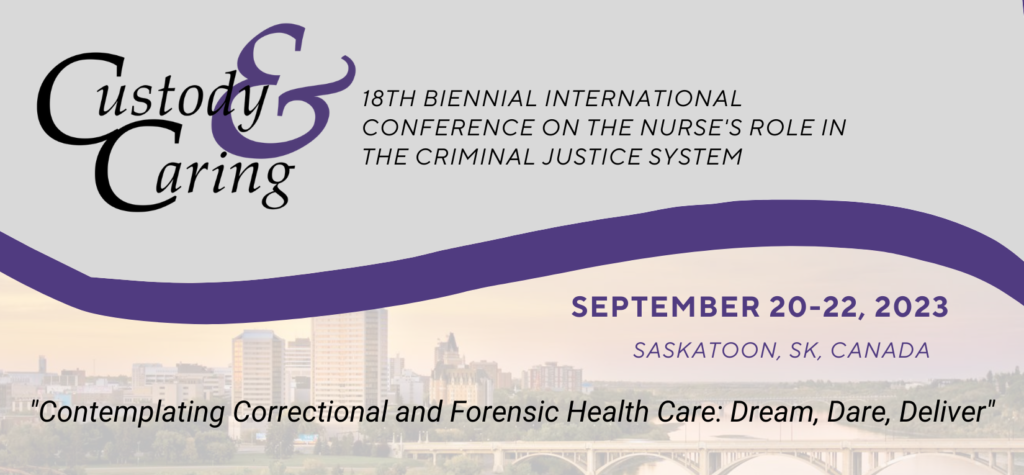Custody & Caring Conference
A research team from Penn State University and Klein Buendel gave three presentations on their recent work related to the care of persons aging and dying in prison at the 18th Biennial International Conference on the Nurse’s Role in the Criminal Justice System. The Custody & Caring Conference was held in Saskatoon, SK, Canada on September 20-23, 2023.
Podium Presentation and Poster 1
“Small-Scale Usability Testing: E-learning Modules for Peer Caregivers”
Growing numbers of people globally will grow old and die while incarcerated. Research evidence supports using peer caregivers to assist staff with geriatric and end-of-life care. Currently, peer caregiver training varies widely in content and duration. Evidenced-based, accessible, and contextually relevant materials are needed to effectively prepare the caregivers. This study’s purpose was to conduct research and development of Just Care, a six-module e-learning program for peer caregivers and a single module to guide corrections staff in implementing the program. University IRB, U.S. Department of Health & Human Services, and Department of Corrections permissions were obtained, and participants signed informed consent. Deputy Wardens assisted in identifying people meeting our inclusion criteria. Nineteen people living in prison and 11 staff took part in the usability testing of the progam. Researchers directed participants to share their thoughts aloud. Field notes were taken. Participants completed six open-ended questions and the System Usability Scale (SUS).
Findings focused on functionality, design, and content of Just Care. All users easily navigated through the program with minimal guidance. Many noted Just Care’s utility for future peer caregivers. Challenges faced were clustered by level of severity from 1-3 (1=most; 3=least severe). There were no severity-level 1 issues in either round. In Round 1, Just Care received a SUS score of 87.5 by incarcerated users and 74.5 by staff. A SUS score of 68 is an above average score. Following rapid refinement, Round 2 incarcerated participants scored Just Care at 85.28 while staff scored it at 83.75. Some incarcerated users had difficulty navigating the post-test assessments in Round 2. A few staff users noted liking the additional resources available via links to PDFs. One staff user voiced concern about the safety of having incarcerated people help with care. Overall, participants found Just Care easy to navigate with interactive content that is very useful, engaging, and relevant to providing geriatric and end-of-life care in prisons. Staff also noted that Just Care raised awareness about the growing need for programming on geriatric care in prisons and that a peer caregiver program like Just Care is a viable solution that is implementable by prison staff.
Poster 2
“Determining Priority Dementia Care Training Needs for Correctional Staff and Peer Caregivers”
People aged 50 and older in prisons are at particular risk for developing Alzheimer’s Disease and Related Dementias (ADRD) due to several social determinants of health. The number of patients in prison with ADRD is not known. This situation can likely be attributed to many corrections health, social, and security staff lacking the requisite skills for identifying ADRD. Dementia care inequities between prisons and community settings need to be addressed. A standardized, feasible, and acceptable ADRD education program developed for those caring for and/or managing people who are incarcerated and living with ADRD is a pressing need.
The key purpose of the research was to identify three priority learning needs of multidisciplinary prison staff to provide enhanced management and care for people living with ADRD in prisons which also represented the critical learning needs of peer caregivers so that they may assist staff with ADRD care. The study also sought to identify a logo to brand the new Just Care for Dementia training. The third outcome was to translate best practices from community-based ADRD care into accessible and relevant content for training staff and peer caregivers that is evidence-based and can be programmed into highly interactive prototype e-learning modules that fit within the restrictive context of corrections. Focus group methodology facilitated potential future users input to aid us in ensuring the content, design, and technology plans match the needs and constraints of prison. Approvals were secured from the: Institutional Review Board; federal government; and Department of Corrections. Participants provided signed informed consent. The settings were one men’s and one women’s state prison in the United States. Twelve interdisciplinary staff and 11 peer caregivers participated.
Thematic analyses revealed three priority content areas: fostering a safe and calm environment; addressing behavioral and psychological symptoms of dementia; and enhancing awareness of need. Insights on nine showcased logos revealed two clear preferences. Consultation with the study’s advisory board informed final logo selection for branding the Just Care for Dementia e-learning product. In conclusion, participants confirmed the need for a such a training program and indicated this is a viable approach to addressing a pressing training and related care need in prisons.
This research was funded by an STTR grant to Klein Buendel from the National Institute on Aging [AG057239; Dr. Susan Loeb (Penn State) and Dr. Barbara Walkosz (Klein Buendel), Multiple Principal Investigators]. Collaborators on the presentation and posters also included Dr. Erin Kitt-Lewis, Mr. Sherif Olanrewaju, and Ms. Katherine Aiken from The Penn State University; and Mr. Brandon Herbeck, Ms. Amanda Brice, and Mr. Steve Fullmer from Klein Buendel.


